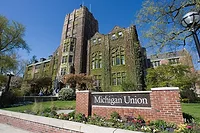UTSA breaks ground on School of Data Science and National Security Collaboration Center

The University of Texas - San Antonio (UTSA) marked the groundbreaking of its $90 million School of Data Science and National Security Collaboration Center with a virtual celebration. The new building is the first in a series planned as part of the university's downtown campus expansion.
The 167,000-square-foot, six-story structure will advances the university’s vision to earn national recognition as a research-intensive institution and bolsters San Antonio’s national standing as Cyber City USA.
“For more than 20 years UTSA has been a pioneer in cybersecurity and also now offers best-in-class programs in data science, cyber manufacturing, cloud computing and artificial intelligence,” said UTSA President Taylor Eighmy. “This new transdisciplinary building, which is deeply connected to the economic well-being of San Antonio and will house the first School of Data Science in Texas, will enable UTSA to prepare students for the high tech jobs of the future and to grow its ecosystem of government, industry and academic partners tackling society’s grand security challenges.”
The SDS will include nearly 86,000 square feet of classroom, laboratory and research space for the 6,500 data science students who are projected to take classes there by 2022. UTSA’s 70-plus faculty members in cybersecurity, cloud computing, data analytics and artificial intelligence will be located there, enabling more frequent collaborations with government, industry and community partners in the heart of San Antonio. The university’s computer science, computer engineering, statistics and data sciences, and information systems and cybersecurity departments will reside in the new facility in addition to its Open Cloud Institute.
The NSCC, which includes more than 81,000 square feet for innovation, laboratories and research, will be co-located with the SDS. Currently operating at the Main Campus, the center is a hub for government, university and industry partners in the cybersecurity field.
The Cybersecurity Manufacturing Innovation Institute will be co-located within the NSCC as well as various collaborative efforts in forensics; visualization and analytics; network security, cyber training and workforce development; big data analytics and privacy; postquantum cryptography, cyber-physical systems and embedded security; cloud security; attack and threat modeling and mitigation; machine learning and artificial intelligence; and platform, software and hardware integrity.
Looking for a reprint of this article?
From high-res PDFs to custom plaques, order your copy today!






